Knowledge Hub
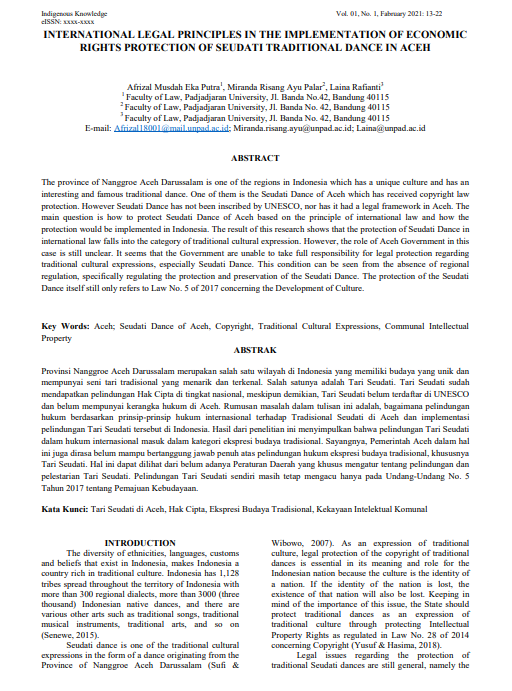
International Legal Principles in the Implementation of Economic Rights Protection of Seudati Traditional Dance in Aceh
2021
Author(s): Putra AME, Palar MRA, Rafiant L
The result of this research shows that the protection of Seudati Dance in international law falls into the category of traditional cultural expression. However, the role of Aceh Government in this case is still unclear. It seems that the Government are unable to take full responsibility for legal protection regarding traditional cultural expressions, especially Seudati Dance.
Helping Culture and Traditional Cooperation of Women in Guilan
2023
Author(s): Nazarimoghaddam J , Abbasi H
This study is a descriptive and analytical research in which an attempt has been made to investigate aspects of the culture of cooperation and cooperation among the women of Gilan with an anthropological approach while paying attention to the lived experience of the people of Gilan. The findings of the research indicate that the forms of help among the women of Gilan are very diverse and diverse, and not only in rice cultivation.
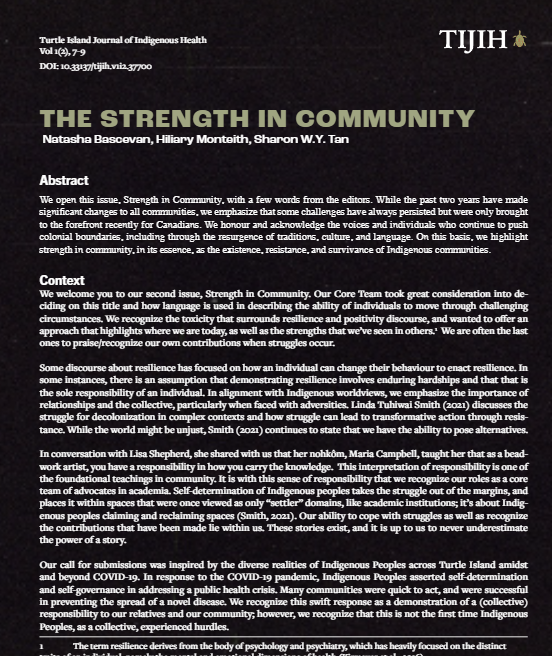
In this issue, we aspire to provide communities with opportunities to tell their own truth, and not be limited to current realities. It is our mission to incorporate methodologies and voices that honour the past, present and future and we hope readers will find evidence of that within these pages. Herein you will find accounts on various topics such as community collaboration, healing journeys, language revitalization, cultural continuity, addiction treatment models, community-based care, reconnecting with traditional diets, methods for community analysis, incarceration, and systemic racism.
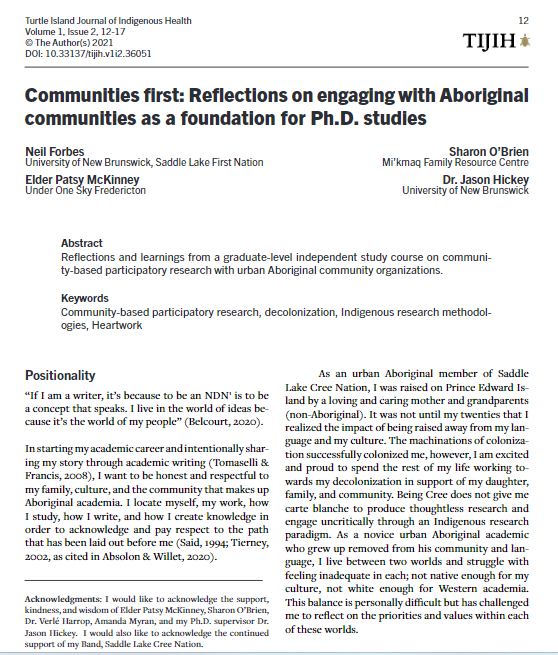
Communities First : Reflections on Engaging with Indigenous Communities as a Foundation for Ph.D. studies
2021
Author(s): Forbes N, McKinney EP, O'Brien S, Hickey J
This process allows for the respectful transmission of knowledge between cultures, or those with different worldviews, which creates an opportunity to develop a decolonized Indigenous research paradigm (Cochran et al. 2008; Wilson, 2008).
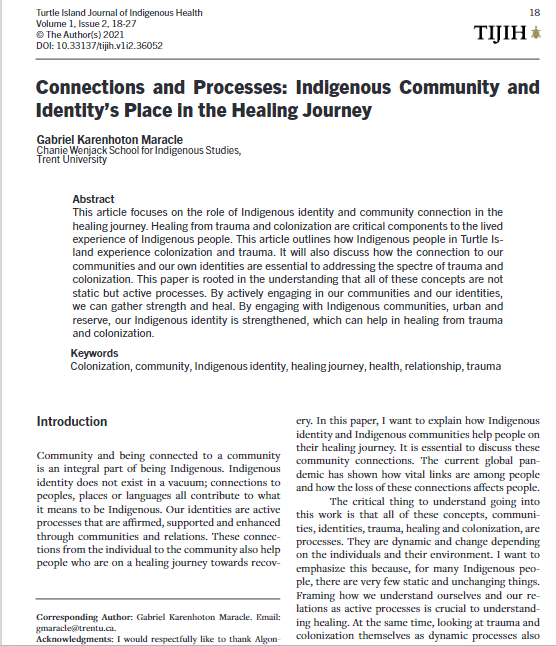
Connections and Processes: Indigenous Community and Identity’s place in the Healing Journey
2021
Author(s): Maracle G
This paper is rooted in the understanding that all of these concepts are not static but active processes. By actively engaging in our communities and our identities, we can gather strength and heal. By engaging with Indigenous communities, urban and reserve, our Indigenous identity is strengthened, which can help in healing from trauma and colonization.
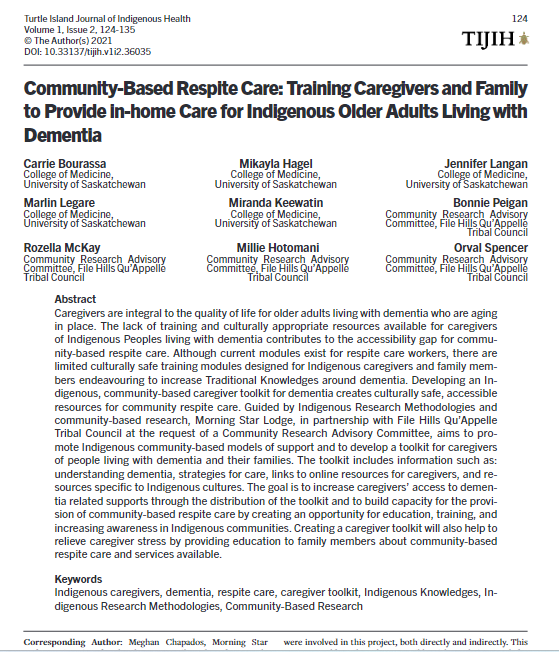
Community-Based Respite Care: Training Caregivers and Family to Provide in-home Care for Indigenous Older Adults Living with Dementia
2021
Author(s): Bourassa C, Hagel M, Langan J, Legare M, Keewatin M, Peigan B, McKay R, Hotomani M, Spencer O
The toolkit includes information such as: understanding dementia, strategies for care, links to online resources for caregivers, and resources specific to Indigenous cultures. The goal is to increase caregivers’ access to dementia related supports through the distribution of the toolkit and to build capacity for the provision of community-based respite care by creating an opportunity for education, training, and increasing awareness in Indigenous communities. Creating a caregiver toolkit will also help to relieve caregiver stress by providing education to family members about community-based respite care and services available.
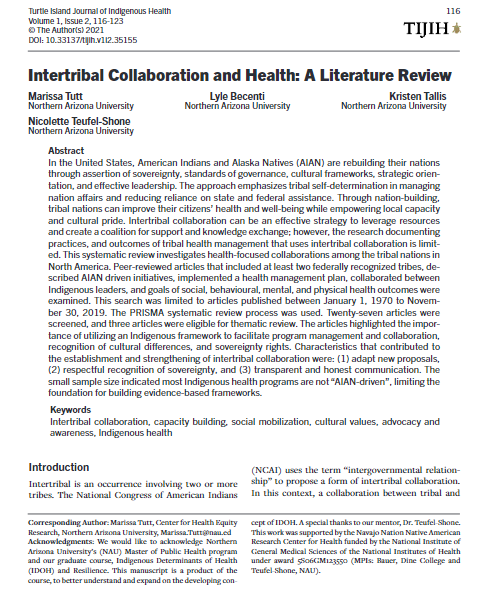
Intertribal Collaboration and Health: A Literature Review
2021
Author(s): Tutt M, Becenti L, Tallis K, Shone NT
This search was limited to articles published between January 1, 1970 to November 30, 2019. The PRISMA systematic review process was used. Twenty-seven articles were screened, and three articles were eligible for thematic review. The articles highlighted the importance of utilizing an Indigenous framework to facilitate program management and collaboration, recognition of cultural differences, and sovereignty rights. Characteristics that contributed to the establishment and strengthening of intertribal collaboration were: (1) adapt new proposals, (2) respectful recognition of sovereignty, and (3) transparent and honest communication. The small sample size indicated most Indigenous health programs are not “AIAN-driven”, limiting the foundation for building evidence-based frameworks.
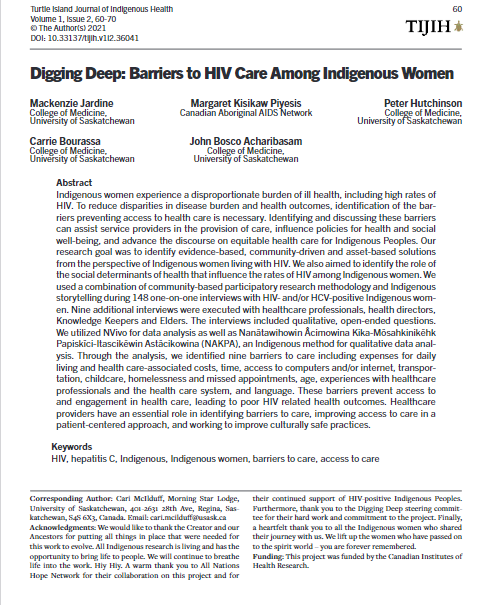
Digging Deep: Barriers to HIV Care Among Indigenous Women
2021
Author(s): Jardine M, Bourassa C, Piyesis MK
Through the analysis, it has been identified nine barriers to care including expenses for daily living and health care-associated costs, time, access to computers and/or internet, transpor-tation, childcare, homelessness and missed appointments, age, experiences with healthcare professionals and the health care system, and language. These barriers prevent access to and engagement in health care, leading to poor HIV related health outcomes. Healthcare providers have an essential role in identifying barriers to care, improving access to care in a patient-centered approach, and working to improve culturally safe practices
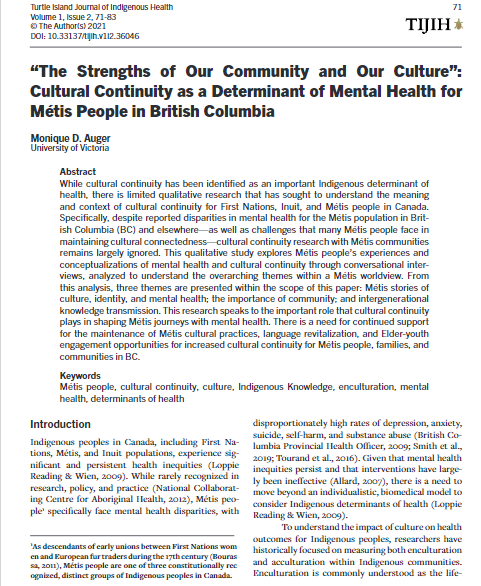
“The Strengths of Our Community and Our Culture”: Cultural Continuity as a Determinant of Mental Health for Métis People in British Columbia
2021
Author(s): Auger M
This research speaks to the important role that cultural continuity plays in shaping MĂ©tis journeys with mental health. There is a need for continued support for the maintenance of MĂ©tis cultural practices, language revitalization, and Elder-youth engagement opportunities for increased cultural continuity for MĂ©tis people, families, and communities in BC.
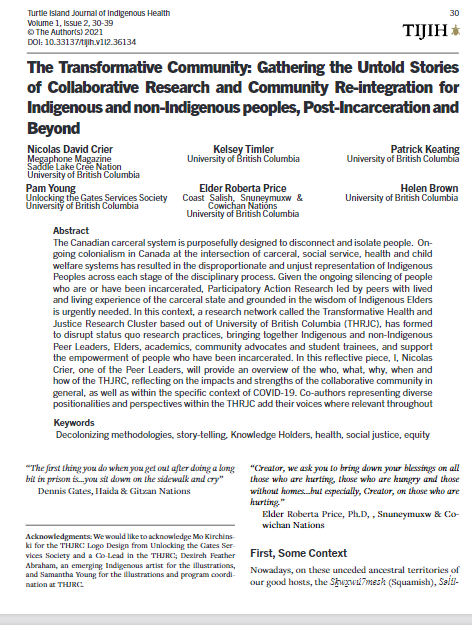
The Transformative Community: Gathering the Untold Stories of Collaborative Research and Community Re-integration for Indigenous and non-Indigenous peoples, Post-Incarceration and Beyond
2021
Author(s): Crier N, Timler K, Keating P, Young P, Brown H, Price ER
In this context, a research network, called the Transformative Health & Justice Research Cluster (THJRC), based out of Vancouver, British Columbia, has formed to disrupt status quo research practices, bringing together Indigenous and non-Indigenous Peer Leaders, Elders, academics, community advocates and student trainees, and support the empowerment of people who have been incarcerated. In this reflective piece, Nicolas Crier, one of the THJRC Peer Leaders, will provide an overview of the who, what, why, when and how of the THJRC, reflecting on the impacts and strengths of the collaborative community in general, as well as within the specific context of COVID-19. Co-authors, representing diverse positionalities and perspectives within the THJRC, will weigh in when relevant.



